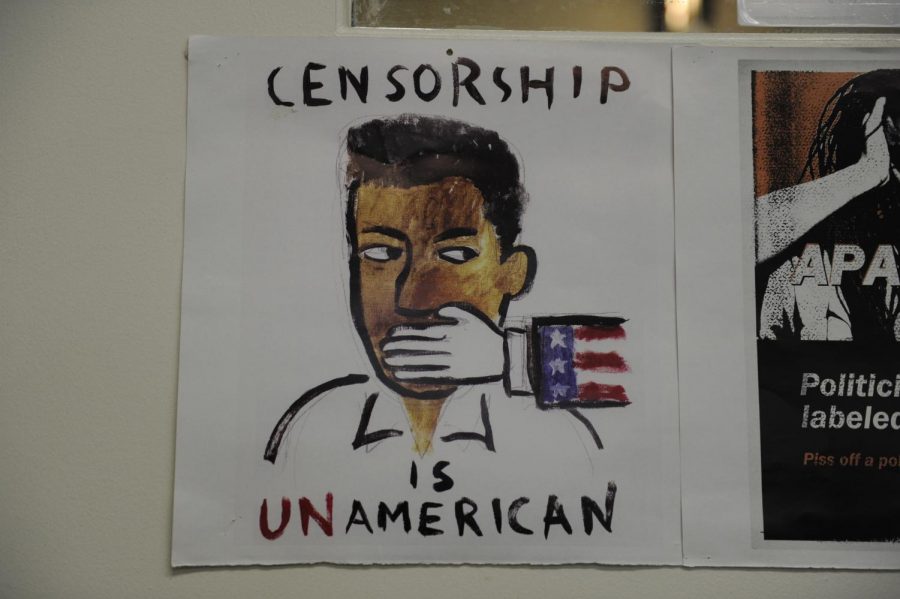Hate Speech IS Free Speech
Weakening America’s core political characteristic of free speech is undermining what makes our democracy so great.
When Google fired James Damore for voicing his opinions on how to improve employee productivity, they not only denied his rights, but challenged the very fabric of free society.
Recent events have often questioned the validity of open, free speech. “Hate speech is not free speech,” was a popular slogan to come out of the Charlottesville protests, and college campuses often harbor hostile groups that violently oppose opinions they hope to suppress. In light of these events, companies have adopted censorship as a solution to deal with dissident opinions.
“By eroding discussion, rather than engaging in conversations about where their opinions conflict, it has become more often for people to try to figure out how to categorize and frame opposing political arguments as forms of unacceptable speech.”
The idea of suppressing views that people don’t agree with has become increasingly popular. The European Union issued an ultimatum to Facebook, Twitter and other social media platforms to remove hateful speech, or face prosecution. Google fired an employee, James Damore, for shedding light on the company’s bias towards left-wing views. College organizations are already actively suppressing conservative opinions. And most recently, President Trump, along with other conservative thinkers, have actively tried to condemn the act of NFL players kneeling to the anthem.
These developments threaten the sanctity of the American democracy, and its values of freedom of speech, expression and character. Under the First Amendment, the circulation of all ideas is what makes America distinct from oppressive, autocratic regimes where political dissidents are often killed or exiled. Censoring opinions and speech dissident from the overruling opinion mirrors those regimes.
However, it is important to acknowledge that the intention of censoring specific popular content isn’t malicious, or meant to purposefully oppress certain opinions, but to support communitarian interests. Proponents of regulating free speech believe in a “defensive democracy,” where the censorship of certain ideas is justified by the values of treating people with fairness, dignity, and maintaining community harmony. The problem is that this approach considers free speech to be mutually exclusive to community maintenance, that one is only achieved at the expense of the other. Not only is this untrue, but often times, suppressing one of the two is counterproductive in fulfilling the interests of either. Rather than maintaining the unity of the community, censorship only breeds further division and polarization.
Censorship of hate speech teaches people that instead of sitting down to discuss issues that they disagree on, calling for the removal of their opinions is a reasonable alternative. It offers a short-term sense of relief over not having to tolerate someone they consider to be irrational. But in the long term, it erodes the art of discussion.
“By eroding discussion, rather than engaging in conversations about where their opinions conflict, it has become more often for people to try to figure out how to categorize and frame opposing political arguments as forms of unacceptable speech,” Raghav Inder ’19 said. “‘Hate speech’ or ‘unacceptable speech’ is viewed as ‘xenophobic and racist’ on the left, and ‘disrespectful and unpatriotic’ on the right, in order to avoid confrontation as a whole.”
The erosion of discussion created by the censorship of ideas by large corporations and the developing habits of people to not engage has created echo chambers on social media and in real life. There is no exposure to a diversity of opinions, further polarizing opinions and reducing any common ground on issues. When people are only exposed to environments of homogeneous opinions, they no longer focus on constructing cohesive arguments to actually persuade others. Instead, their only focus is to satisfy those who agree with them. As a result, they grow even more extreme.
When citizens grow disgruntled over why no meaningful legislation and change can ever be passed in the American political system, they must realize that it isn’t the natural disagreement of issues that inhibits progress; rather, a multitude of opinions is a natural element of democracy. Our current political environment, and the people’s astonishment over how pressing issues in society could have such incompatible solutions, is a result of the purposeful factionalism that the censorship of opinions create.
James Damore complained of the lack of political diversity at Google, but instead of holding a discussion about his opinions, or at the very least allowing him to voice his opinion, Google immediately fired him. The backlash that ensued resulted in conservative media portraying Damore as a martyr for free speech, and employees with conservative opinions becoming afraid to voice opinions of their own.
On social media, people can already block content they don’t like and are fed content that caters to their interests. Forcibly censoring content would be excessive and authoritarian, and would take away the most basic right of people to choose what they want to see. Thus, the solution to handling dissident speech is to further its exposure to all communities even more, and allowing for the discussion of actual ideas to be brought up. It grants people the liberty to evaluate for themselves what speech is unacceptable. If some sort of opinion is so vulgar or offensive to tolerate, then it shouldn’t take manual censorship for people for them to realize their discontent with such opinion. By encouraging conversation about why certain ideas are valid in society, it becomes necessary for individuals to justify their arguments to each other, instead of taking the shortcut of categorizing opposing arguments as forms of unacceptable speech that should be censored.
Oliver Chin is a Staff Reporter for ‘The Science Survey’ and a Groups Section Reporter for ‘The Observatory.’ He appreciates journalism because...

